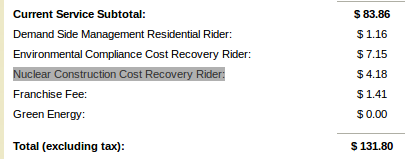For those of you concerned about nuclear energy, here are some quick, meaningful actions you can take today. Maybe you aren’t concerned about nuclear energy. I bet you ARE concerned about $$$$.Learn more about how Georgia Power is getting your money at the state and federal level. All US taxpayers all over the US are basically cosigning a loan for $8.3 B for the Vogtle reactors. Simultaneously, Georgia Power is raising your electric rates to fund the pre-construction costs by pulling the same advanced cost recovery scheme as SC and FL. You can learn more about the controversy surrounding the loan guarantees here
Calculate how much Vogtle is costing you on your monthly bill
(Look for “Nuclear Construction Cost Recovery Rider:”)
-Mandy Hancock
Short Link:

Mandy, where do you get this non-sense?
1. The financing of new nuclear construction is structured exactly the way you would finance the construction of a new home. When you go ask your banker for a loan to start construction, he approves the loan ONLY if you agree to start paying him back immediately. Why? Because if you don’t start paying the lender, the financing costs — even for a private residence — can quickly far-exceed the actual cost of construction. Paying a little now, saves millions later.
2. Nuclear fuel (uraniaum) is extremely low-cost, unlike coal and natural gas. Over the 60-year life of a nuclear energy facility, it is a better deal for all of us if we use nuclear power rather than pay outrageously high prices for natural gas. Plus, nuclear has no carbon emissions so its good for the environment. Even most Lefties reluctantly acknowledge that.
3. DOE loan guarantees to solid, A-rated electric utilities — like Southern Company — have not cost the taxpayers a single penny. In fact, utilities have paid millions of dollars in application fees to the US government just to be considered for them. Taxpayers are on the hook for Solyndra because it was a high-risk venture with no track record of performance, no real product to market and it was not an A-rated investment.
Yes, I work in nuclear. And it’s annoying for me to see my own industry let this non-sense go without a response. Get the facts straight.
If you work in nuclear, you know about all the reactors that closed or never opened because of technical, business, and political risks, which is why nobody would invest without the federal government guaranteeing the investment. The taxpayers known as Georgia Power customers are already paying the price for gapower’s Vogtle boondoggle, and the GA PSC has agreed that those customers will have to pay for any cost overruns. The current reactors at Vogtle had huge cost over-runs when they were built. No new reactor has been approved to be built in the U.S. for 30 years because nuclear is the riskiest power generation industry. Re: you 2, uranium low-cost? Only if you ignore all the externalities, such as at Jaduguda. -jsq
Greenpeace co-founder says nuclear is “most efficient” energy source
Nuclear power is the sole energy source that can provide emissions-free electricity on a large scale, writes Patrick Moore, a co-founder of Greenpeace. Renewable sources such as wind and solar are expensive, and are too intermittent to replace nuclear plants and other base-load facilities. Nuclear “is the most efficient form of energy available,” Moore adds. To read more, go to Richmond Times-Dispatch (Va.) (10/23)
NRC panel approves Westinghouse AP1000 reactor design
Dateline: Pittsburgh
The Nuclear Regulatory Commission’s technical staff recommended to the full commission that it give final design certification to Westinghouse Electric Co.
http://www.pittsburghlive.com/x/pittsburghtrib/s_763241.html
Sure, and clearcutting is the most efficient method of forestry, too. If you ignore all the externalities, like erosion, flooding, increased wildfires, loss of species diversity, and economic fragility due to monoculture cropping. The NRC keeps re-certifying reactors that are past their design lifetimes. It gave Vogtle a green light only a few days before one of its reactors had to shut down this summer. Regulatory capture, it’s not just for telecommunications! -jsq